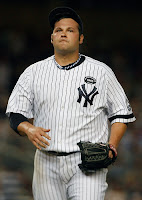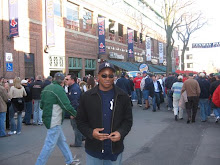
NEW YORK – We are a very forgiving group of people.
Well, most of us are.
At Yankee Stadium Sunday, a rain delay lasted in excess of two and a half hours.
Normally, for a game at home against the Royals, many fans would head for the exits, unconcerned with the result until they got home.
However, a good majority of fans stayed in the park. They were not there to see the Yankees bludgeon the Royals with seven additional runs after the fifth inning when the downpours began.
Instead, they stayed to be a witness to baseball history if you want to call it that. Alex Rodriguez was in his pursuit of homerun number 600.
The slugger came up two more times in the game. In the seventh, he reached on an infield single to drive in a run. In the eighth, as if the stars could align, the Yankees were able to bat around to bring him back to the plate again, this time with the bases loaded.
Everyone at Yankee Stadium stood as one, loudly cheering a man who used to receive loud boos for his failure before delivering emphatically last October when the team finally won its world championship.
Oh, and that whole steroids thing? Forget that it ever happened.
That is all in the past, at least for some.
Not for me.

For Rodriguez unfortunately, it is difficult to ignore and impossible to forget.
Instead of slugging number 600, a rising fastball hit off his forearm and hand, sending him straight to the ground in pain, not giving him a chance to reach the career milestone.
If you want to call it that.
Throughout the season, there has been an empty feeling that surrounds this “pursuit”. Back in 2007, anticipation was high to see him hit number 500. It took him 28 at-bats to do it, but we celebrated the accomplishment.
At the time, there was the belief that because of feeling of illegitimacy around Barry Bonds and his alleged steroid use, Rodriguez would eventually become the all time leader for homeruns by the time his career was over and would have done so without the use of performance enhancing drugs.
That all went away in 2009 when after reports surfaced in Sports Illustrated combined with Rodriguez’s personal admission of doing the steroid “boli” for three seasons while he was in Texas as a way to deal with the burden of expectations that came with his $252 million contract he signed after 2000 with the Rangers.
Once that happened, everything genuine about the historic numbers compiled one of the most talented players baseball has ever known changed. Rodriguez became just “another one”, adding himself to list of drug cheats that have littered the game over the last 20 years, drastically inflating their own numbers for personal and monetary benefit at the expense of the authenticity of the game.
Do I simply accept the numbers put up by him and anyone else and call them real for no other reason than to say that of the biggest drug users, he was the best of the best?
Many have drawn that conclusion as they did with Bonds, Mark McGwire and Sammy Sosa. As a result, all of their accomplishments are looked at as fraudulent, with some wanting their records wiped away from the record books.
Those players do not receive a high level of scrutiny as Rodriguez because he is only active player visual to us on a daily basis. For the rest of his career, the debate can rage on about his greatness that will be in the eye of the beholder.
All of Rodriguez’s accomplishments can be put into question now. Is he still on PED’s? Without testing for human growth hormone, no one will ever know. This is the situation created by himself and now for the rest of his career, the viewing public will never really know for sure if what they are seeing is realistic.
This is why even though the hype surrounding this feat coming from those on the Yankee payroll (see: John Sterling, Suzyn Waldman and Michael Kay) whose voice you hear the loudest, it is the consumer that ultimately makes the final judgment.

Sunday, many fans casted their vote by waiting out the rain, showing that they have forgiven him and accept his previous transgression while appreciating the player that they did not fully accept until the Yankees won big.
In the end, here we have an immensely talented player that now suffers from a case of the “Yeah, but”.
“Rodriguez will likely break the home run record…but he was a cheater.”
“Rodriguez is an all-time great player…but he cheated.”
Most of them did, benefiting greatly. The others that did it and have yet to be caught have escaped scrutiny, which is part of what makes him somewhat of a sympathetic figure in all of this.
That is what makes this so difficult.
As Rodriguez heads on the road this week to Cleveland and then to Tampa Bay for the Yankees seven game road trip, percentages are high he will hit number 600 sometime this week.
You want to appreciate it, but you have to stop yourself.
It is record in statistic only, lacking in any true meaning.
Time for another edition of Yankee Random Thoughts
For reasons we have still yet to conclude, Phil “The Franchise”
 Hughes seems to have a problem pitching at Yankee Stadium this season.
Hughes seems to have a problem pitching at Yankee Stadium this season.The numbers may simply be a coincidence and a statistical anomaly, but right now there seems to be a distinct difference between his performance on the road and how he does at The Stadium.
Hughes split his two home starts this week against the Angels and the Royals to make his record 12-3. However, one startling number stands out and that is the 15 homeruns allowed, all of which have taken place at home.
So why the difference?
According to Hughes, he may be trying too hard to do his best at home instead of controlling his emotions. This excess energy has allowed pitches to flatten out on occasion, leading to home runs.
I have long since been of the opinion that the only way the Yankees can lose in October is if both The Underachiever and Javier Vazquez are both in the same postseason rotation.
You cannot allow these two to hijack the season by them melting down in October.
If they lose with Hughes blowing up, I can accept that. But there is no way I can accept both of them pitching three of the seven games in a series.
Think about it, the Yankees can have a 20 –game winner pitching
 out of the bullpen.
out of the bullpen.Despite Vazquez being the second best pitcher on the Yankees since May, even if he threw like the 1999 version of Pedro Martinez, he will still keep me up at night before he takes the ball in Game 4.
If Wednesday’s performance was any indication, he will give me plenty of reason for worry.
After needing only 37 pitches to get through four innings, Vazquez mysteriously lost it, throwing 39 pitches, giving up three runs as the Angels cut a six run deficit in half that could have been worse if Erick Aybar stupidly did not attempt to steal third base with one out while they had him clearly on the ropes.
Girardi left him in the game to begin the sixth and gave up a two-run homer to make it 6-5 and his afternoon was over.
What happened? I have no answer.
I may be going down with the Vazquez ship, but I want to make everyone aware that the possibility for a meltdown can happen.
When did Boone Logan start throwing 97 MPH on the gun? I don’t believe this.
Left unexplained by the offense is their inability to hit Sean O’Sullivan on Tuesday night after the first inning.
O’Sullivan had no command of the strike zone and was behind 2-0 with the bases loaded. One big hit and his night likely would have been over.
Instead, he get the final out and the Yankees did not get another hit off him until the seventh inning.
Odd.
Even more odd was that the very next day, O’Sullivan was traded by the Angels to the Royals and started against the Yankees again.
Reality set in on Sunday when he gave up five runs over four innings, confirming that his performance five days earlier was a fluke.

Joba Chamberlain better get his act together. His performance again on Saturday did not inspire any confidence and nearly led to Mariano Rivera coming into the game in the ninth for a save situation if the Yankees did not score five runs in the eighth on Sunday.
When Scott Podsednik is taking you deep, that is problematic.
Quietly, David Robertson has pitched much better as of late, but he still runs into occasional mechanical problems with his delivery, causing balls to float out of the zone.
That is the reason for the 10 walks since June 5 despite rebounding from a slow start to begin the year, pitching to a 2.10 ERA with 20 strikeouts.
Thursday night against the Royals, entrusted to hold a one-run lead in the seventh inning. He was able to get a pop out and strikeout to end the inning, setting the table for the Yankees to add five insurance runs over the next two innings.
What is the deal with the umpires lately?
On Tuesday, Girardi went out toward first base to argue a call on a close play involving Mark Teixeira.
The Yankee first baseman was ruled out and replays confirmed that he did not reach safely. Girardi however, did not agree.

While arguing his case, Bruce Dreckman, the home plate umpire came over wanting to give his two cents for whatever reason. Clearly confused as to why he was interjecting himself in a conversation that did not involve him, Girardi angrily told him in so many words to “butt out”.
The next day, Brett Gardner disputed a called second strike and argued, leading to an ejection.
Colin Curtis would have to come to the plate quickly as a substitute. He worked the count to 3-2 and then hit a three-run homer to right to put distance between them and the Angels in a 10-5 win.
Umpires need to stop acting as if we pay to see them. Get lost.
If I know your first and last name, that is not a good thing.
Think of the irony of this for a moment:
One pitcher is injured on the mound, tweaking his groin and will miss the next five weeks.
The other acts like a loon, cuts himself, lies about it (at first) and he gets to make his next start without a problem.
Burnett shutout the Royals for 5 innings, earning a win after an extended rain delay shortened his evening.
Life is just not fair.




























